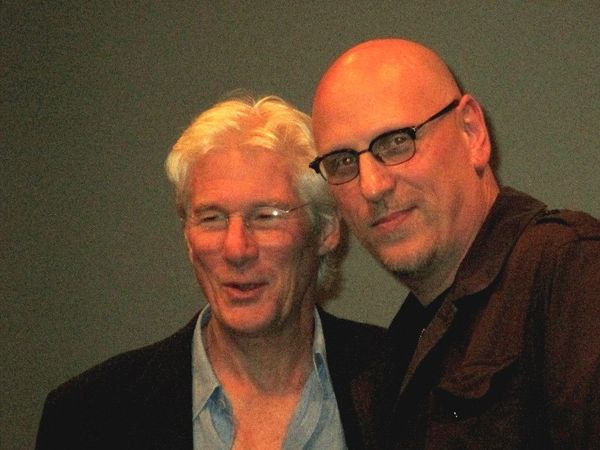 |
| Richard Gere with Time Out Of Mind director Oren Moverman: "We've been friends since I'm Not There." Photo: Anne-Katrin Titze |
Oren Moverman's undercover Time Out Of Mind stars Richard Gere with Ben Vereen, Kyra Sedgwick, Jena Malone and Steve Buscemi. At the New York Film Festival press conference the link between Bob Dylan and I'm Not There was revealed and the importance of studying Saul Leiter's photographs by the director. The line in Richard Gere's mind between Robert Bresson's Pickpocket and Dostoyevsky through American Gigolo turning into Time Out Of Mind drew out the process.
Church bells ring. There is the skyline of Manhattan. Where from? What is this perspective? There is a butterfly at the window. A man walks into an almost empty apartment, cursing. There is another man with a cut on his brow, waking up in a dry bathtub. "Nobody lives here," says the first man. "This is my home" comes the reply.
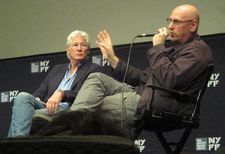 |
| Time Out Of Mind director Oren Moverman with Richard Gere: "The idea of shooting through windows was finding the reflections of the rest of New York." Photo: Anne-Katrin Titze |
So begins Time Out Of Mind, a film sharing its aesthetic with Saul Leiter photographs and its sounds with the city of now. We follow George (Gere), a homeless man, during his days and nights. No backstory, no constructed drama distracts from seeing what we don't really want to look at. A man lands on a bench in a shabby coat with three dress shirts piled on top of each other, clutching a black garbage bag in one hand, a bottle in brown paper in the other. He rests in a seat on an empty train. Then the train is crowded. A woman sits right next to him. The smell can't be so bad. Slowly, we start to think with him. No ID, no Social Security number, no home, no work, no family to give shelter, no bed to sleep in, no food, no smile, no word. Or many words.
A self-proclaimed "Jazz Man" he meets in one of the city shelters is played by Ben Vereen with an endless stream of talk. An Irish nurse in the hospital emergency room waiting area allows George to stay there but when it's over 32 degrees, the rules tell him to leave. George's grunts and coughs punctuate the hours. "Shelters are like prison - they're designed to be shit," says the man in the next bed. George suggests to a woman collecting bottles in her cart, if she'd have a six pack of beer with him. "Do I get to keep the cans?" she asks as they start their date. I did not recognise the woman as Kyra Sedgwick. Time Out Of Mind shows people who are treated as non-entities, who are physically in front of us and feel they don't exist.
After the press conference, I asked Oren Moverman about the one element in Time Out Of Mind that looked like a choice made for the sake of symbolism. Richard Gere's George was allotted bed number 33 in the shelter. "Pure coincidence," Moverman told me with a smile. He wanted him to have the one in the middle, and that was the number - the Christ connection a welcome side effect that links to the start of the film.
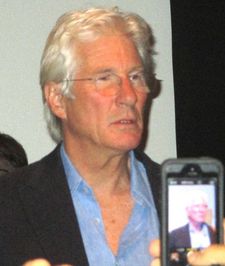 |
| Richard Gere on Time Out Of Mind: "I had this script and I was looking for someone like Oren Moverman to do it. We were so much on the same wavelength." Photo: Anne-Katrin Titze |
Oren Moverman: When Steve Buscemi at the very beginning finds him in the bathtub, the first thing he says is "Jesus Christ".
Anne-Katrin Titze: And the bed number 33 in the shelter was really just coincidence?
OM: Yes. But it was coincidence that I embraced.
AKT: When you said the film is about compassion and perspective, that's absolutely it.
OM: Completely. That's what we aimed for.
During the press conference Richard Gere and Oren Moverman discussed the extraordinary development and perspective of their film with Amy Taubin.
Oren Moverman: Richard Gere came to me with the idea of this film.
Richard Gere: The script came to me ten years ago. It was actually written about the late 80s. I couldn't get it out of my mind. We ran into each other. We've been friends since I'm Not There, the Bob Dylan movie. And I had this script and I was looking for someone like Oren Moverman to do it. We were so much on the same wavelength. Oren had that incredible sense of the process being the movie. The actual process of living, of going through the bureaucracy is enough plot. You don't need to come up with anything else. His [George's] life itself is enough. The way we shot was with extremely long lenses, as you could tell. The footprint of the filmmakers was very far away.
Amy Taubin: No one did recognise you?
RG: This was one of the most bizarre things about this. Oren has a real bizarre sense of time on set. He doesn't feel rushed. I'm quite aware of two hours of storytelling. He told me to slow down. You don't have to rush things. Then I started to get intoxicated with this other sense of time also.
OM: We shot through store windows, through apartments, there was always something getting in the way. We wanted it to be about perspective. How do you get the perspective on something that is happening and unfolding outside your window? For compassion, to recognize somebody else. We wanted to make a movie that is about what is there when you look up from your cellphone. It's not glamorous, just bare-bones filmmaking.
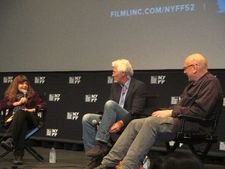 |
| New York Film Festival selection committee member Amy Taubin with Richard Gere and Oren Moverman Photo: Anne-Katrin Titze |
It was really about going into New York and getting that sense of the guy on the corner that you don't notice. It was about living in the city, watching it, and creating these very simple situations. There's no bad guys. We didn't create extra drama. We wanted to deal with everything that most people who shoot in New York take out of the movie. We wanted it to be the feeling of being in New York.
You're walking on the street and there's violence, conflict, drama happening to everyone. Part of the non-judgmental approach of this movie was that everybody is fighting a great battle. I walked around the city and recorded secretly, covertly all these conversations of real New Yorkers. I am not accusing anyone of living their lives and not noticing that around the corner there's a long line of men trying to get into a shelter. I never saw that long line at Bellevue until I actually started shooting there.
We just wanted to say you can notice whatever you want, you can listen to something else and not really watch parts of the movie. We did a couple of friends-and-family screenings and when I introduced the movie I said, keep your cellphones on. When you get a call, take it. Just keep being engaged in your life and see how this movie fits into it. We're asking you to watch something that you don't really want to watch.
We really studied the photography of Saul Leiter, one of the pioneers of the New York School of Photography. He explains where sometimes you don't know what the subject of the frame is you capture the object in a true layered way. Reflections what New York really looks like when you look out through a store window. We thought of it being very still with a zoom lens because I'm obsessed with zooms. It was about finding Richard in the environment that surrounds him. The movie was really about having the perspective that we all have every day in our lives, doing our thing. We don't try to solve the homeless question. We don't have answers. We have one story of one person. The idea of shooting through windows was finding the reflections of the rest of New York.
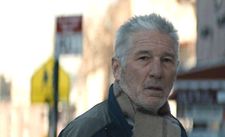 |
| Richard Gere in Time Out Of Mind: "it's actually worse than being invisible. It's a black hole that you're sucked into." |
RG: The quality that doesn't change is a really intuitive one. It's what it feels like to be homeless. That hasn't changed at all. How quickly one descends into really scary states of consciousness when you're invisible. And I keep telling people, it's actually worse than being invisible. It's a black hole that you're sucked into. You're radiating homelessness. The first day we were testing, the camera was in a Starbucks and I'm out there on the street to see if it's going to work. I'm still making movies, so I'm still out there. I was a little scared actually, anxious, personally, that I would be that naked out on the streets.
No one saw me. I was out there 45 minutes, we shot digitally, very long takes. I started approaching people, not harassing them: "Can you help me out? Spare any change?" No one made eye contact. Even when someone gave me a dollar bill. That was the first time when I really felt inside what it is. And me, I come here and you want to hear what I have to say, I seem iconic somehow and it is romantic. I'm the same guy on the street that no one wanted to hear. No one wanted to hear his story.
I can see how quickly we all can descend into that territory when we are totally cut loose from all our connections to people and love and affection. And just general being well thought of. The kindness that someone is looking at you and smiling, thinking I wish you happiness.
OM: Kyra [Sedgwick] read the script. She wanted to play this woman [who lives on the street collecting cans and bottles], she wanted to transform. She went out and talked with homeless people and came back with a lot of notes. I then wrote that monologue but that was all taken from a homeless woman whom she met. It was her enthusiasm, her ownership of that role. Ben Vereen we sent the script, we met for lunch, and he basically sat down and said I need to make this movie, and here's why.
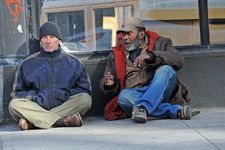 |
| Richard Gere and Ben Vereen in Time Out Of Mind: "I can see how quickly we all can descend into that territory." |
RG: The genesis of American Gigolo was Pickpocket by Robert Bresson. That was also a movie about procedure, how to pick a pocket. What does a pickpocket do was really what the film was and that came from Dostoyevsky. There's a certain line here. What do people do, not in terms of plot. What does a homeless guy do? The guy only asks for two things. I need a place to sleep and I'm hungry. We decided in the process of writing and rewriting this film [not to have the character's backstory]. In our own lives we make judgements on people based on how they look. We posit education, where they might live, where they come from very quickly. That's really what we were doing. Let's just present a guy here. It's a Rorschach test for everyone.
There was two or three times people talked to me on the street. Once was a French tourist, a woman who totally thought that I was a homeless guy and gave me some food. The other two times were African Americans and they just passed me and said, Hey, Rich, how are you doing? No question, what happened to you? Have you fallen on hard times? The whole thing was predicated that for a lot of this movie I would be on the streets and New York would be passing me by.
Public screenings at the New York Film Festival for Time Out Of Mind - Sunday, October 5, 6:00pm - Monday, October 9, 8:45pm
The Film Society of Lincoln Center will honour Richard Gere on October 8 during the New York Film Festival with a dinner and conversation with Kent Jones.
The 52nd New York Film Festival runs from September 26 - October 12.





















